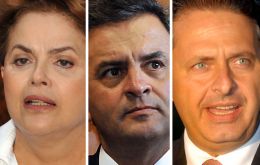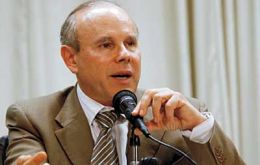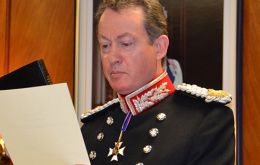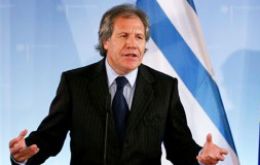MercoPress. South Atlantic News Agency
Politics
-
Friday, June 6th 2014 - 08:16 UTC
Argentina announces auto industry accord with Brazil; May sales collapsed 40%

Argentina agreed to sign a one-year deal with Brazil to regulate vehicle trade between both countries, after a meeting held between Industry Minister Débora Giorgi and her Brazilian counterpart, Mauro Borges. The agreement will be signed on June 11 in Buenos Aires.
-
Friday, June 6th 2014 - 08:02 UTC
Italy planning to boost economy by including shadow economy as part of GDP

Drugs, prostitution and arms smuggling may not be legal, but it's all real economic activity, at least in Italy, which will now include illegal enterprises as part of its gross domestic product (a measure of the goods and services a nation produces). Italy has decided to boost the size of its economy by including the value of black market activities.
-
Friday, June 6th 2014 - 07:40 UTC
Malvinas OAS resolution calls for resumption of UK/Argentina negotiations on sovereignty

The Organization of American States, OAS, annual assembly unanimously approved on Thursday a resolution on the Malvinas Islands calling on Argentina and the UK to resume negotiations regarding the sovereignty dispute.
-
Thursday, June 5th 2014 - 07:20 UTC
High inflation and unemployment challenging Brazilian economy in election year

With the World Cup just eight days away, high inflation and unemployment is once again challenging Brazil’s economy, with the impact sure to influence this year’s election campaigns. Investors warned earlier this week that spending promises will undermine the fiscal discipline needed to restore confidence in the country and boost economic growth.
-
Thursday, June 5th 2014 - 07:15 UTC
Dilma claims FIFA had pledged that stadiums would be built with private funds

As Brazil rushes to finish stadiums and deal with a wave of protests ahead of the June 12 kick-off, president Dilma Rousseff partly blamed FIFA for the spiraling World Cup bill but said the money spent would leave a positive legacy.
-
Thursday, June 5th 2014 - 06:59 UTC
Sao Paulo metro workers declare an indefinite strike stranding 4.5m commuters

Sao Paulo metro workers voted Wednesday evening an indefinite strike beginning Thursday following the collapse of salary negotiations.
-
Thursday, June 5th 2014 - 06:54 UTC
Brazil scales back levies on foreign loans to help prop the national currency

The government of Brazil is cutting the tax obligations faced by business receiving foreign loans, opening the door to more financing opportunities, while helping address the problem of the falling value of the national currency, Real.
-
Thursday, June 5th 2014 - 00:04 UTC
Falklands developing strongly and with a high international community profile

Falkland Islands are enjoying the benefits of a healthy well managed economy, with excellent present and future prospects in its main industries, but also face challenges such as the need for manpower, closely linked to immigration, planning for a balance between environment and oil industry, a modern government and the continued attempts by Argentina to stifle the Islands economy and block economic development.
-
Wednesday, June 4th 2014 - 20:26 UTC
Falklands' welcomes rig-contract which marks beginning of oil drilling season in first quarter of 2015

The Falkland Islands Government welcomed the announcement on Thursday morning that a drilling rig has been contracted by a consortium of licensees for a new six-well program of offshore exploration and appraisal work commencing in early 2015.
-
Wednesday, June 4th 2014 - 09:14 UTC
Uruguay ready to receive Guantanamo prisoners and displaced Syrian children

Uruguayan government negotiations with Washington to receive detainees from the US jail in Guantanamo base, and with the UN to host Syrian children and their families are well advanced, revealed Foreign minister Luis Almagro.
